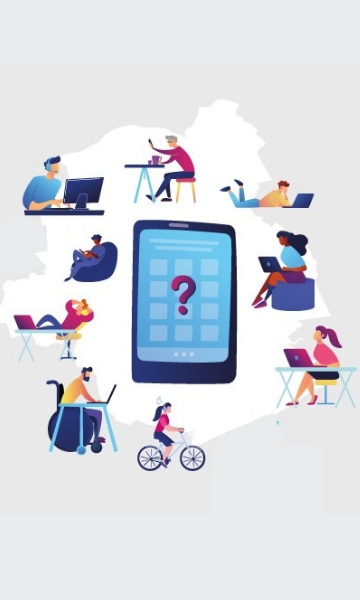Imagine a region where ALL citizens are equipped with basic digital skills and have access to digital technology! This is the aspiration that the Digital Brussels call for projects was built on. Launched by the Brussels Region, in partnership with the King Baudouin Foundation and the Digital Inclusion Coordination, the call for projects has resulted in a selection of 30 winners (24 FR files and 6 NL files) from 132 proposed projects. Each project benefits from financial support ranging from €5,000 to €15,000, with a total amount of almost €390,000.
The priority: no one should be left by the wayside!
Digital innovation will only be experienced as progress if all sections of the population have access to digital technology and are equipped with the necessary digital skills to find a job, carry out online administrative procedures, monitor their children's schooling, communicate with friends and family etc. In short, to access fundamental rights and to flourish in our increasingly virtual society.
The proposed projects in the framework of the Digital Brussels call had to address one of the three following areas: accessibility of digital tools, training from a very young age and supporting society towards a digital transformation that is accessible to all, including the most vulnerable. This is because digital vulnerability particularly affects certain profiles, including people with low incomes and low levels of education.
"The future will be digital. The success of this call for projects confirms the relevance of a project to support citizens in making better use of digital devices and services for private and professional life. These initiatives will allow us to take a big step towards fulfilling the potential of all Brussels citizens," states Brussels Minister of the Digital Transition, Bernard Clerfayt.
Committed and ambitious winners
The 30 winning projects were selected by an independent jury of experts. They will be implemented in the course of 2021, for a period of one year.
The target groups of the selected projects are very varied: young people, job seekers, people with disabilities, sick children attending distance learning courses, the elderly, occupants of social housing, women of immigrant background etc.
The 30 projects are very different, but they all share a common goal: making digital technology a vehicle for integration and participation in society. Some projects are organising the movement of mobile social teams, others will seek out people in difficulty to offer them support in Digital Public Spaces (DPS), and still others are creating 'buddies' and peer supporters...
